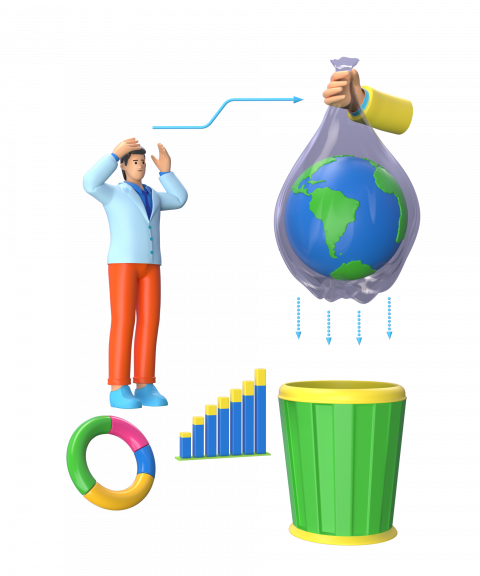The water bottle is a crucial part of daily life in India due to the climate, water is a great concern, and the need for hydration. The most common usages of water bottles in India & their usage are while travelling, in Schools and Colleges, Workplaces, Gyms and Fitness, Outdoor Activities and our day-to-day home usage, We will also talk about types of water bottle available for use, Health issues with related to water bottles and how we can overcome or minimize the health risk.
What is the use of water bottle in our day-to-day routine?
1. Hydration on the Go: A water bottle is used to stay hydrated at the same time as travelling, commuting, or strolling errands. In a country with various weather situations, it's crucial to have water with no trouble to be had.
2. Schools and Colleges: Students deliver water bottles to colleges and colleges to make certain they have got get entry to to smooth consuming water during the day. Many academic establishments also promote the use of reusable bottles to reduce plastic waste. 3. Workplaces: Employees often bring water bottles to offices and offices to live refreshed for the duration of the workday. Many offices offer water dispensers or purified water to encourage hydration.
4. Gyms and Fitness Centers: People deliver water bottles to gyms and fitness centers to preserve themselves hydrated throughout workouts. Staying hydrated is essential for physical health, in particular in India's warm and humid regions.
5. Outdoor Activities: Whether it is picnics, hiking, or sports activities, water bottles are a have to for outdoor enthusiasts. They make sure that people have get right of entry to to secure ingesting water even as enjoying enjoyment sports.
6. Home Use: Many families in India shop filtered or purified water in large bins and use water bottles for serving and ingesting water. This is mainly not unusual in areas with unreliable water elements.
What Types of Water Bottle do we use?
- Plastic Water Bottles: These are the most commonplace and affordable kind of water bottles. They are to be had in numerous sizes and are lightweight. However, there are worries approximately the environmental impact of unmarried-use plastic bottles.
- Stainless Steel Water Bottles: These are long lasting, reusable, and eco-friendly options to plastic bottles. They can hold water cool for prolonged intervals and are frequently selected for his or her toughness.
- Glass Water Bottles: Glass bottles are safe for storing water as they do now not leach chemicals into the water. However, they may be fragile and no longer appropriate for outdoor or rugged use.
- Copper Water Bottles: Copper bottles are famous in India for their capability fitness benefits. It is believed that storing water in copper bottles could have diverse fantastic outcomes on health.
- Aluminum Water Bottles: These are light-weight and sturdy, making them suitable for outdoor sports. They also are recyclable, which is an green function.
- Collapsible Water Bottles: These area-saving bottles are crafted from flexible materials that can be collapsed when not in use, making them convenient for vacationers.
- Filtered Water Bottles: Some water bottles include built-in filters or purifiers, allowing customers to fill them from numerous water assets whilst ensuring safe ingesting water.
- Infuser Water Bottles: These bottles have a compartment for adding fruits, herbs, or other flavorings to infuse water with natural flavors.
It's crucial to pick out the sort of water bottle that suits your way of life, preferences, and environmental issues. In latest years, there has been a developing fashion in India closer to reusable and eco-friendly water bottle alternatives to reduce plastic waste.
How water bottle is Health-hazardous?
Health-hazardous water bottles can pose serious dangers to people if they incorporate dangerous materials or are used improperly.
Here are a few examples of health dangers associated with water bottles:
- BPA (Bisphenol-A) Contamination: Some older plastic water bottles, especially the ones crafted from polycarbonate plastic, may additionally incorporate BPA, a chemical that could leach into the water. BPA has been linked to fitness problems consisting of hormone disruption, fertility troubles, and developmental worries, even though many contemporary water bottles are now BPA-unfastened.
- Phthalate Exposure: Phthalates are chemicals often utilized in plastics to growth flexibility. Exposure to sure phthalates has been associated with unfavourable health results, such as endocrine disruption, reproductive issues, and potential hyperlinks to weight problems and diabetes.
- Lead Contamination: In a few instances, low-best or poorly synthetic water bottles, particularly the ones manufactured from sure metals or plastics, can also contain lead. Lead publicity can lead to severe health problems, mainly in youngsters, which includes developmental issues, gaining knowledge of disabilities, and neurological problems.
- Microbial Growth: If water bottles aren't properly cleaned and dried, they are able to turn out to be breeding grounds for bacteria, mould, and other microorganisms. Consuming water from contaminated bottles can motive gastrointestinal problems and infections.
- Unsafe Materials: Water bottles made from substandard materials, which includes low-pleasant plastics or metals, might also contain dangerous substances or pollutants. These materials can leach into the water over time and pose fitness risks.
- Improper Cleaning: Failure to clean water bottles often can cause the boom of harmful bacteria and mould. People who do now not smooth their bottles nicely may additionally inadvertently eat those contaminants, which could result in contamination.
- Chemical Reactions: Some water bottles, mainly those manufactured from positive metals or plastics, can react with the water they contain, altering its flavor and probably freeing dangerous chemicals into the water.
How to minimize health risks related to water bottle?
To minimize health risks related to water bottles, take into account the following precautions:
- Choose BPA-free and phthalate-loose water bottles, in particular if the usage of plastic ones.
- Opt for official manufacturers and amazing substances.
- Clean and sanitize your water bottle regularly, following manufacturer tips.
- Avoid exposing water bottles to intense temperatures, as this could affect the materials and doubtlessly release harmful substances.
- Replace damaged or closely worn water bottles, as they will pose a greater danger of leaching dangerous substances or harboring contaminants.
It's essential to prioritize the protection and nice of water bottles to make certain that the water you consume remains secure and unfastened from potential fitness hazards.


.jpg)
.jpg)
.jpg)

.jpg)
.jfif)


.jpg)

.jpg)
.jpeg)

